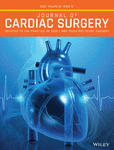Surgical infection prophylaxis prior to left ventricular assist device implantation: A survey of clinical practice
Parts of this manuscript were presented at ID Week, October 2019, Washington, DC.
Abstract
Background
Short duration, antimicrobial prophylaxis that includes antistaphylococcal activity is recommended at the time of left ventricular assist device (LVAD) implantation to reduce infection-related complications. There continues to be wide variability in surgical infection prophylaxis (SIP) regimens among implantation centers. The aim of this study is to characterize current SIP regimens at different LVAD centers.
Methods
A survey study was conducted from 26 September 2017 to 25 October 2017. Surveys were distributed electronically to LVAD coordinators and infectious diseases specialists at 75 US medical centers identified as having an LVAD program. Data collection included information about antimicrobial selection, duration, Staphylococcus aureus screening, and decolonization procedures.
Results
We received 29 survey responses. The majority of surveys were completed by infectious diseases physicians (72.4% [21 out of 29]). Most responding centers reported LVAD programs established for greater than 10 years (20 out of 29 [69%]). Cardiac transplantation was performed in 28 out of 29 (96%) centers. Of centers reporting a defined SIP regimen for non-penicillin allergic patients (96% [28 out of 29]), 17.9% (5 out of 28) reported a four-drug regimen, 35.7% (10 out of 28) reported a three-drug regimen, and 46.4% (13 out of 28) reported a two-drug regimen, while no centers reported a single-drug regimen. Empiric fluconazole was common (50% [14 out of 28]) and 96.4% (27 out of 28) of regimens included vancomycin. Duration of antimicrobial prophylaxis (24 hours to 5 days), S. aureus screening, decolonization procedures, and alterations due to drug allergies varied across participating centers.
Conclusions
Our survey results indicate wide variation in SIP regimens among participating LVAD centers. These results highlight the need for studies evaluating the implications of SIP regimens, and whether clinical factors that prolong antimicrobial duration impact postoperative infection rates.
CONFLICT OF INTERESTS
Dr Milano and Dr Bishawi disclose financial relationships with Medtronic and Abbott Labs. The remaining authors declare that there are no conflict of interests.




